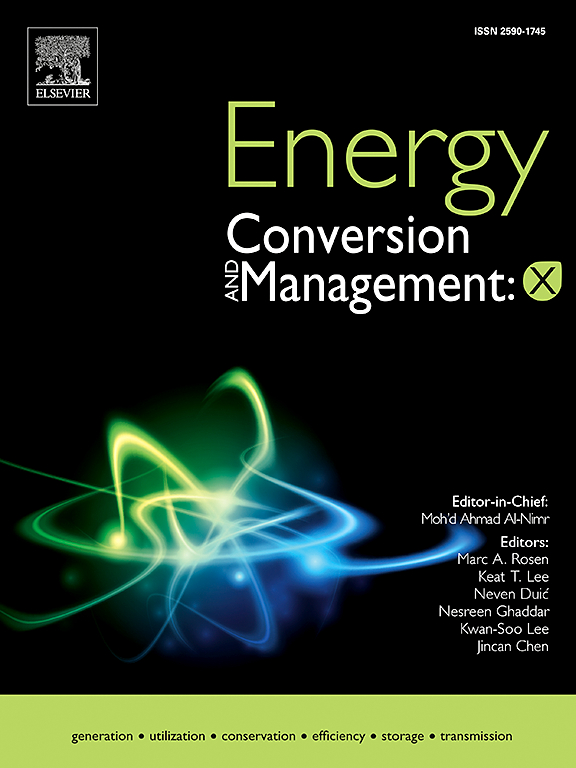Influence of vehicle and battery ageing and driving modes on emissions and efficiency in Plug-in hybrid vehicles
IF 7.1
Q1 ENERGY & FUELS
引用次数: 0
Abstract
Plug-in hybrid electric vehicles (PHEVs) can operate in both charge-depleting (CD) and charge-sustaining (CS) modes offering flexibility to users and potentially playing a critical role in the transition path towards the transport decarbonisation. This study assesses the impact of vehicle and battery ageing on PHEV emissions, energy and fuel consumption, through two approaches: detailed laboratory testing of a representative gasoline PHEV and fleet-wide real-world data analysis. After 47,000 km and two years of driving the aged vehicle exhibited higher CO, NOx, and THC emissions, and lower particle number (PN) emissions due to improved filter efficiency. Laboratory tests revealed a 7 % increase in CD CO2 emissions, a 2.2 % reduction in all electric range, and a 4.8 % decline in battery capacity, indicating battery degradation. Meanwhile, CS CO2 emissions and energy consumption decreased by 2.1 % and 2.8 %, respectively, possibly due to reduced drivetrain friction losses. A fleet-wide analysis of over 1,900 similar PHEVs registered in the European market uncovered a significant gap, up to 3.5 times, between official and real-world CO2 emissions, complicating efforts to assess long-term ageing effects. Annual distance driven correlated with increased real-world CO2 emissions and a decrease in electric drive share (EDS), indicating insufficient battery charging during longer trips. Over two years, PHEVs driven primarily in electric mode showed 5 % higher CO2 emissions, pointing to the possible impact of battery ageing, while those driven mainly in conventional mode saw emissions decrease by 2 %. These findings provide novel insights into how PHEV performance evolves with age, offering critical data for researchers and engineers to better address emissions and battery durability standards as vehicles age.
车辆和电池老化以及驾驶模式对插电式混合动力汽车排放和效率的影响
插电式混合动力电动汽车(PHEV)可以在电量耗尽(CD)和电量维持(CS)两种模式下运行,为用户提供了灵活性,并有可能在实现交通脱碳的过渡道路上发挥关键作用。本研究通过两种方法评估车辆和电池老化对 PHEV 排放、能源和燃料消耗的影响:对具有代表性的汽油 PHEV 进行详细的实验室测试,以及对整个车队进行实际数据分析。在行驶了 47,000 公里和两年后,老化车辆的一氧化碳、氮氧化物和四氢大麻酚排放量增加,但由于过滤器效率提高,颗粒数(PN)排放量降低。实验室测试显示,CD 二氧化碳排放量增加了 7%,全电动行驶里程减少了 2.2%,电池容量下降了 4.8%,表明电池出现了退化。与此同时,CS 的二氧化碳排放量和能耗分别降低了 2.1% 和 2.8%,这可能是由于传动系统摩擦损耗减少所致。对欧洲市场上注册的 1,900 多辆类似 PHEV 进行的全车队分析发现,官方公布的二氧化碳排放量与实际排放量之间存在显著差距,最高可达 3.5 倍,这使得评估长期老化效应的工作变得更加复杂。每年行驶的距离与实际二氧化碳排放量的增加和电力驱动份额(EDS)的减少相关,这表明在长途旅行中电池充电不足。在两年时间里,主要以电动模式行驶的 PHEV 的二氧化碳排放量增加了 5%,这表明电池老化可能产生影响,而主要以传统模式行驶的 PHEV 的排放量则减少了 2%。这些研究结果提供了关于 PHEV 性能如何随使用年限而变化的新见解,为研究人员和工程师提供了重要数据,以便随着车辆使用年限的增加,更好地解决排放和电池耐用性标准问题。
本文章由计算机程序翻译,如有差异,请以英文原文为准。
求助全文
约1分钟内获得全文
求助全文
来源期刊

Energy Conversion and Management-X
Multiple-
CiteScore
8.80
自引率
3.20%
发文量
180
审稿时长
58 days
期刊介绍:
Energy Conversion and Management: X is the open access extension of the reputable journal Energy Conversion and Management, serving as a platform for interdisciplinary research on a wide array of critical energy subjects. The journal is dedicated to publishing original contributions and in-depth technical review articles that present groundbreaking research on topics spanning energy generation, utilization, conversion, storage, transmission, conservation, management, and sustainability.
The scope of Energy Conversion and Management: X encompasses various forms of energy, including mechanical, thermal, nuclear, chemical, electromagnetic, magnetic, and electric energy. It addresses all known energy resources, highlighting both conventional sources like fossil fuels and nuclear power, as well as renewable resources such as solar, biomass, hydro, wind, geothermal, and ocean energy.
 求助内容:
求助内容: 应助结果提醒方式:
应助结果提醒方式:


